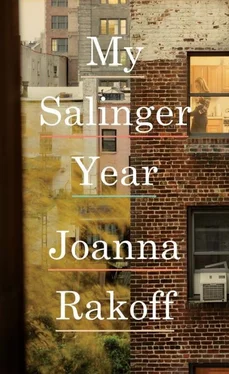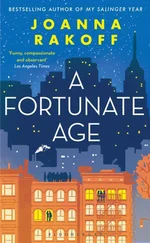“I just—” Could I tell her I wanted to be a writer? I wasn’t sure that I could. “There are things I want to do. I love this”—I held my hands up, gesturing to the books, the very walls around me—“I love it here. But there are things that if I don’t do now, I’ll never do.”
“I understand,” she said, and I truly believed she did.
With Don, I wavered, too. Of course I did. James had not found that editor who would fall in love with his novel. I went home with him for Christmas, as planned. We returned to Brooklyn in time for New Year’s Eve. Another party at which I had nothing to say. The next morning I woke up and the first thing I thought was Jerry’s birthday . He would be turning seventy-eight. It was also the original publication date for the “Hapworth” book, the book that would never happen, the book that would always consist of one single case of sample covers, stored, I presumed, in Roger’s basement. He didn’t seem the type to throw such relics away. Around the time I left, a story about the book appeared in a paper we’d heard of: the Post . Salinger never officially told my boss that the deal was off. His silence told us all we needed to know. I had used the same trick with my college boyfriend, I supposed. He had recovered from it, or so he said, but I wasn’t sure I had. Would the same, I wondered, be true of Jerry and Roger?
Regardless, with Don, I told the truth. “I feel like a different person from that girl you met,” I said.
“It’s not you, it’s me,” said Don with a laugh. Not a cackle. Just a laugh.
“Sort of,” I told him. This was true and not true. Maybe he was right. There was no one truth. Truth: a schoolgirl thing.
When I left, I packed up a bag of clothing to drop off at Goodwill: my plaid skirts, my loafers. I was not a schoolgirl anymore.
Thirteen years later, I tiptoed out of my children’s room and collapsed into my own bed, with a book. Through the bedroom window came the dull rush of traffic on the Williamsburg Bridge, the cars bound for Brooklyn, for my old neighborhood. Less than a year after I left the Agency, my grandmother died, leaving me her apartment on the Lower East Side. Like her, I was raising two children there, children who played in the same parks my father and his brother played in, and my grandmother and her sisters before him. Like my father, they walked across the Williamsburg Bridge to visit their friends, who were the children of my friends. And like Holden—and like me—their childhood played out against, was defined by, the city’s grand institutions. They, too, spent Saturdays passing under the great whale at the Museum of Natural History and inspecting the armor at the Met. They, too, rode the carousel in Central Park. They tossed crumbs to the ducks in the pond.
From the hallway, I heard the pad of my husband’s feet. “You’re awake!” he said. All too often, I fell asleep with the children. Though I also rose hours before they woke to write in my closet-sized office, a lesson I’d learned all those years before, during my year at the Agency, from Salinger.
“I know,” I said, with a yawn. “I don’t know how it happened.”
Leaving his post by the doorjamb, he came over and sat down next to me. “I’m afraid I have some bad news.”
I sat up, suddenly fully awake. Three thousand miles away, in the foothills of San Jose, my father lay dying. Within a few months of my parents’ retiring to California—also not long after I left the Agency—his doctors diagnosed a syndrome similar to Parkinson’s. A syndrome whose effects he’d, apparently, felt for years. “Some patients are experts at masking the symptoms,” one of his doctors told us. “Your father was an actor, wasn’t he?”
“Is it my father?” I asked. I hadn’t heard the phone ring, but that didn’t mean anything.
“No, no,” said my husband. “J. D. Salinger. Died.”
“Oh.” I let out a long breath. “Oh.”
“I know he was—” His hazel eyes blinked behind his glasses as he tried to formulate this thought. What was Salinger in the tableau of my life? In the twelve years he’d known me, I’d reread Franny and Zooey and Raise High the Roof Beam, Carpenters annually, Catcher every two or three years. My Salinger paperbacks were falling apart, their pages yellow and crumbling, their covers taped together. I could buy new copies, but I didn’t. “I know he was important to you.”
“He was,” I said, allowing myself to be embraced. “He was.”
“You should go to sleep,” he said, finally. “It’s late.” Our two-year-old had taken forever to get to bed, a not-uncommon occurrence.
“Yes,” I agreed. But a few minutes later I found myself in the living room, pulling Franny and Zooey off the shelf. Our edition was a hardback, actually, bequeathed to me—along with paperbacks of Catcher and Seymour —when my parents moved to California, the same edition I’d stared at, day in and day out, during my year at the Agency.
Here’s the thing: People say you outgrow Salinger. That he’s a writer whose work speaks to the particular themes and frustrations of adolescence. The latter might be true. Certainly, I can attest to the fact that many of the people who wrote letters to him ranged in age from approximately twelve to twenty-two. I don’t know how I would have regarded Salinger had I read him in middle school. But I encountered Salinger as a grown-up or rather, someone who, like Franny, was just sloughing off my childhood, my received ideas about how to live in the world. And, thus, with each passing year—each rereading—his stories, his characters, have changed and deepened.
At twenty-four, I identified so strongly with Franny—her exasperation with the world, with the men like Lane who dominated it—that the story’s structural perfection, its gorgeous precision and symbolism, its balance of social satire and psychological realism, its dead-on dialogue, eluded me. At twenty-four, I’d thought, I want to write like that . At thirty-seven, I still wanted to write like that, but I had a better understanding of why , a hope that someday that “why” would become a “how.”
All these years later, I still —still —felt like Franny, overwhelmed by the suffering around me, by all those egos. Perhaps, like Holden Caulfield, “I act quite young for my age.” Perhaps I’ll always be a person who gets “quiet emotional,” like the boy from Winston-Salem, who knows you can’t go around bleeding all over the world, but can’t manage to stanch myself. Perhaps I had married someone rather too much like Lane Coutell. Three years later, I would pack up my children and leave him for my college boyfriend.
But now I equally love—my heart truly breaks for—Bessie Glass, who’s lost two of her seven children, one to his own hand. Bessie, who wanders through her apartment like a ghost, who fears—so much that she can’t think straight—that whatever demons plagued Seymour might plague Franny, too. There is a point in “Zooey” that is almost unbearable, a point at which I always have to put the book down and take a breath: Zooey is haranguing Bessie for not recognizing The Way of a Pilgrim as belonging to Seymour. Franny, you see, had told her mother that she happened upon the book at her college library. “You’re so stupid, Bessie,” Zooey says furiously. “She got [it] out of Seymour and Buddy’s old room, where [it’s] been sitting on Seymour’s desk for as long as I can remember.” And then Bessie says, “I don’t go in that room if I can help it, and you know it… I don’t look at Seymour’s old—at his things.”
That was the point at which the tears arrived. A few pages later, Zooey asks Franny if she wants to talk to Buddy. “I want,” Franny says, “to talk to Seymour.”
Читать дальше












